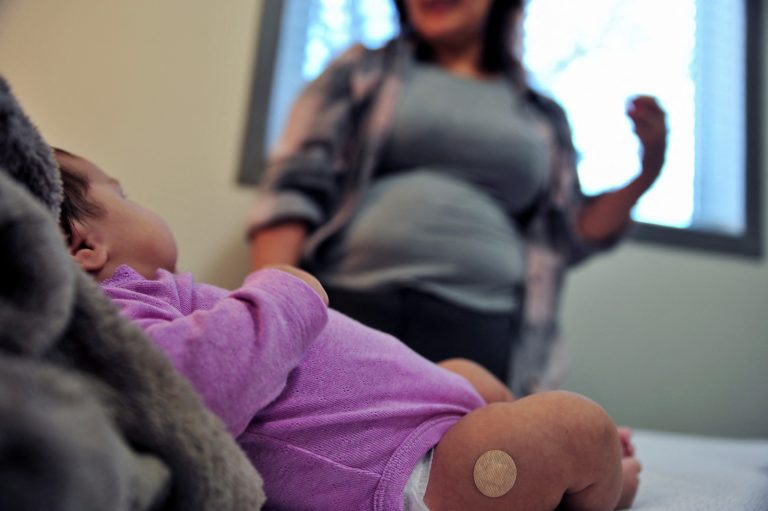The U.S. has the highest rate of infant syphilis cases worldwide, followed by Canada, realizing the highest increase, researchers say, but they have no clue what brought it about.
Canada leads the West with a 13-fold increase over five years of syphilis cases in babies, according to Health Canada. Only in the U.S. is this number higher.
The incidence of babies born with syphilis went up from 2 per 100,000 live births in 2017 to 26 in 2021, according to Health Canada data up through that year, and this trend is expected to continue through 2022 and 2023, according to the preliminary government data obtained by Reuters.
According to preliminary data from the U.S. Centers for Disease Control and Prevention (CDC), only the United States had a higher incidence of syphilis at birth among the G7 group of wealthier countries for which data is available: 74 per 100,000 live births in 2021, triple the rate in 2017.
There were 2,677 cases of congenital syphilis in the U.S. in 2021 for a population of 332 million, according to preliminary CDC data. According to Health Canada, Canada had 96 cases for a population of 38 million.
‘Marker of inequality’
Success
You are now signed up for our newsletter
Success
Check your email to complete sign up
Researchers pinpoint socioeconomic and ethnic factors as possible causes, as indigenous people in the prairie provinces seem particularly hit.
People experiencing poverty, homelessness, and drug use, and those with inadequate access to the health system, especially those in the three prairie provinces: Manitoba, Saskatchewan, and Alberta, where remote populations and Indigenous populations are more likely to contract the disease, public health researchers said.
READ MORE:
- On Hidden Camera, FDA Employee Says Blow Darts Should Be Used to Force Vaccinate Blacks, Low IQ Whites
- Canadian Casket Manufacturer Sees a Surge in Demand for Youth Caskets
- Canadian Doctor Blows Whistle on Neurological Side Effects of Moderna Vaccine in First Nations Indigenous
- 22-Year-Old Canadian Health Worker Crippled After First Moderna Dose Won’t Qualify for Provincial Vaccine
Saskatchewan Province in Canada saw 185 cases of congenital syphilis per 100,00 live births in 2021.
“In high-income countries, you see it in pockets of disadvantaged populations,” said Teodora Elvira Wi, who works in the WHO’s HIV, Hepatitis, and sexually transmitted infection program, Reuters reported.
About 40 percent of the women had no recorded ethnicity, and about 45 percent identified as Indigenous. According to census data, Indigenous people comprise about 5 percent of Canada’s population.
“It’s a marker of inequality,” Wi said. “It’s a marker of low-quality prenatal care.”
‘Multiple failures along the path’
Jared Bullard, a Manitoba pediatrician researching babies born with syphilis since 2021, in an ongoing study for the Public Health Agency of Canada, said a lot needs to go wrong for a newborn to have developed syphilis.
Bullard and colleague pediatrician Carsten Krueger discovered that at least two-thirds of the 165 infants in their study exposed to syphilis were born to mothers with a drug addiction background.
“It’s pointing at multiple failures along the path,” Bullard said.
Ameeta Singh, an infectious diseases specialist with an HIV/STI practice in Edmonton, Alberta, shared a similar opinion. “All of the social circumstances that contributed to this have just gotten worse over the pandemic,” she told the press agency.
According to Alberta Health Services spokesperson James Wood, women of the 15-29 cohort comprised more than fifty percent of the cases of a “significant increase” in syphilis rates. “The reasons for the increase are not fully known, but it is likely that a variety of factors have contributed to this rise,” Wood said.
‘The solution is right in front of us’
According to the WHO, Syphilis in pregnancy is the second-leading cause of stillbirth worldwide. That is, if COVID-19 mRNA vaccinations taken by duped mothers are excluded as those were not listed as possible causes of dead babies and miscarriages by the report.
In fact, authorities have no clue what caused the syphilis epidemic. Yet, they attempt to achieve the impossible: Stemming the surge in cases by increasing ratcheting their testing numbers and trying to ease transmission.
This month, Health Canada ramped up its testing frenzy with new types of syphilis and HIV tests that can yield a result within a minute and immediate action to be taken.
“We probably need a million tests to get out there around the country,” Sean Rourke, a scientist with the Li Ka Shing Knowledge Institute at St. Michael’s Hospital in Toronto, said. “The solution’s right in front of us.”
















